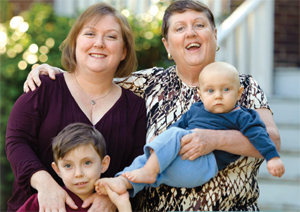Seniors Emergency Center: Donna's Story

Donna O'Donnell Bounces Back After a Fall
When Donna O’Donnell tumbled down the stairs in a movie theater she was shocked. “I couldn’t believe it happened,” the 69-year-old says. “I was dazed, but I thought I was okay.” However, the next morning Donna was really hurting. Still, she thought the pain would go away and decided not to see her doctor.
Donna lives in Riverdale with her daughter, Julie, her son-in-law and their two children. A few days after the fall, Julie decided enough was enough.
“My mom was in a lot of pain and she needed to get an X-ray,” Julie explains. “We live closer to another hospital, but I insisted on going to Holy Cross Hospital,” Donna says. Julie had no problem with that, having had both of her children at Holy Cross Hospital where she received excellent care.
Expert Care
Upon arrival at the hospital’s Emergency Center, a triage nurse evaluated Donna’s needs using a Triage Risk Screening Tool. For those age 65 and above, this tool flags patients who have a cognitive impairment, have difficulty walking, are taking multiple medications or have recently been hospitalized.
Based on Donna’s age and the fact that her condition was not life threatening, she and Julie were assisted to the Seniors Emergency Center. Opened in November 2008, Holy Cross Hospital was the first hospital in the nation to create an emergency room specifically tailored to serve a growing senior population and those who care for them.
A Unique Setting
“The Seniors Emergency Center is located in a separate, enclosed area of the main Emergency Center,” says James A. Del Vecchio, MD, medical director, Emergency Center. “It includes six curtained bays, two private patient rooms, a dedicated nursing station and a small consultation room.”
While Donna and Julie were in the Seniors Emergency Center, they experienced some of the center’s unique characteristics that help to ensure excellent patient care. These features include:
- Special senior-friendly lighting, soft colors and noise-reducing features
- Hand rails
- Special flooring that reflects light in a way to make missteps less likely
- Thicker mattresses to reduce pressure
- Blanket warmers
- Telephones with larger buttons
- Special speakers to make listening to music or watching television more comfortable
Going the Extra Mile
“The doctor was very nice to my mother,” Julie says. “He really listened to her concerns.” After meeting with Donna, Daniel Kenneth Sherk, MD, emergency medicine, ordered X-rays of her elbow, wrist and shoulder.
But Donna’s care didn’t end there. Her risk assessment, which was completed when she first entered the Emergency Center, noted she was taking five or more medications. Could the side effects— or combinations—of her medications contribute to any future falls? To be sure, a hospital pharmacist reviewed all of Donna’s medications and the dosages.
“We call this medication review a poly-pharmacy evaluation and it is one of the many ways we safeguard our senior patients,” Dr. Sherk explains. The Seniors Emergency Center team treats each visit as part of a bigger picture, rather than viewing a visit to the Emergency Center as an isolated incident.
It is this continuum of care that really sets the Seniors Emergency Center apart. Donna was diagnosed with a rotator cuff injury and left the hospital with discharge information in hand, a prescription for pain medicine, and instructions to follow up with her primary care physician and an orthopedist.
A call the next day from a member of the senior care team reviews the patient’s condition, any outstanding issues, discharge instructions, prescriptions and more. Donna also was referred to the hospital’s Falls Prevention Program, which consists of a falls risk assessment, education and exercise program.
To learn more about the Seniors Emergency Center or our Falls Prevention Program, visit http://www.holycrosshealth.org/seniors-emergency-center.
